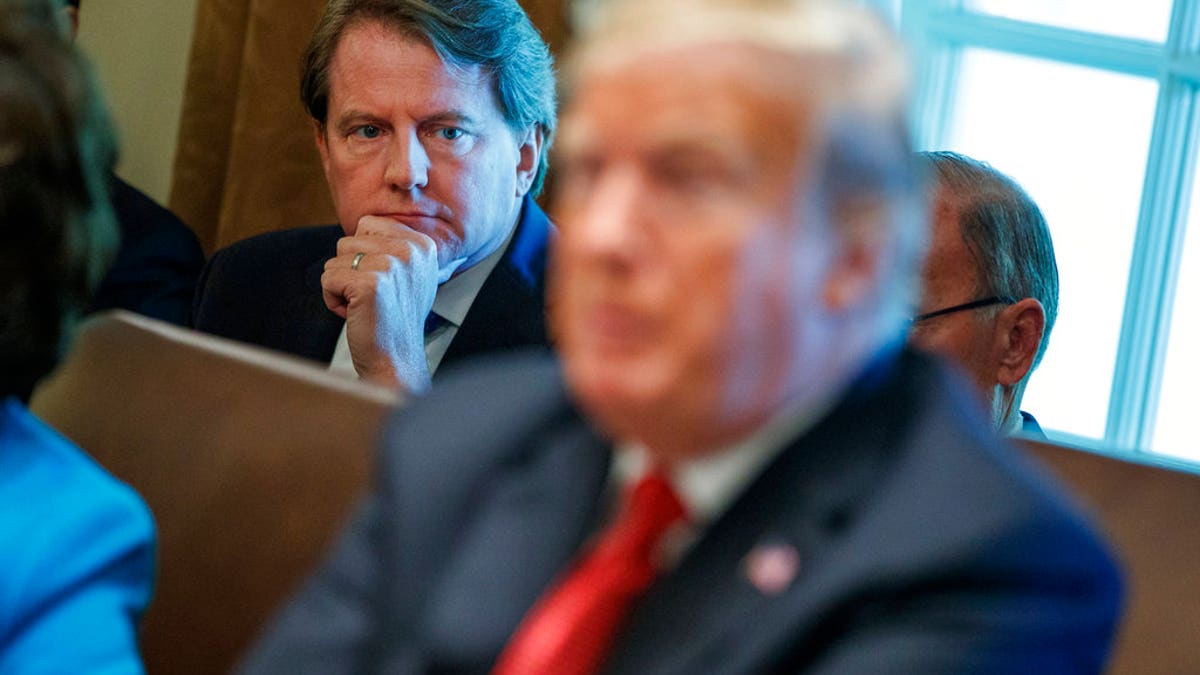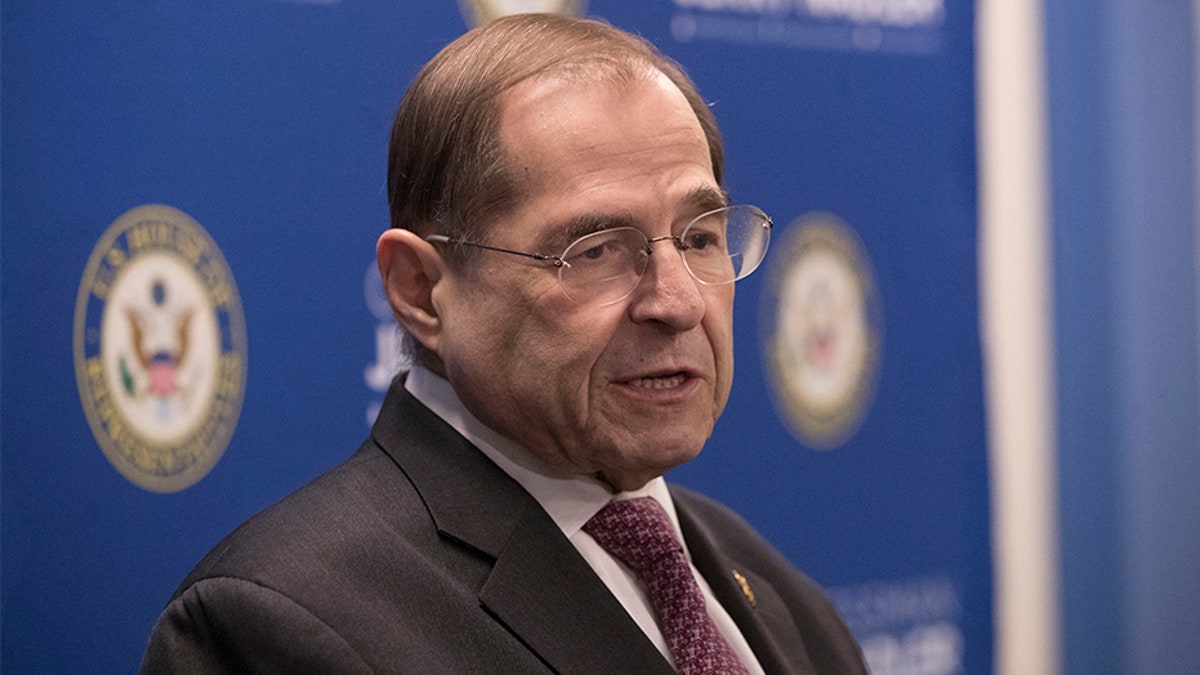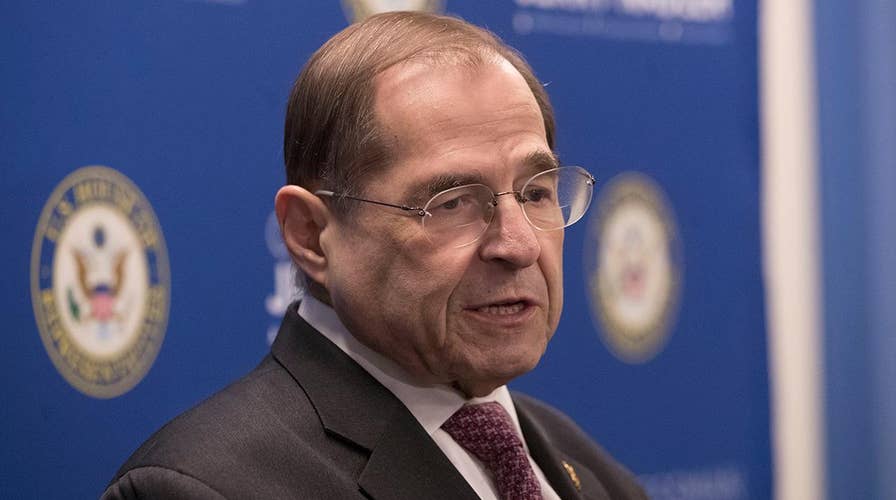Nadler subpoenas former White House counsel Don McGahn
Former White House counsel Don McGahn has been subpoenaed to testify publicly following the release of Special Counsel Robert Mueller's report on the Russia investigation. Former U.S. assistant attorney and Fox News contributor Andy McCarthy reacts.
The White House will fight House Democrats' subpoena of testimony and documents from ex-White House counsel Don McGahn, Fox News is told -- and almost immediately, House Judiciary Committee chairman Jerry Nadler, D-N.Y, characterized the move as "one more act of obstruction" by the Trump administration.
The brewing fight over the McGahn subpoena was poised to set up a series of other contentious legal showdowns as Democrats seek to publicly question more current and former Trump aides who featured prominently in Special Counsel Robert Mueller's report on the Russia investigation.
Fox News is also told the White House intends to vigorously oppose subpoenas that might run up against executive privilege, a power sanctioned by the Supreme Court that allows the president and members of the executive branch to shield certain internal communications from disclosure, absent a compelling overriding justification.
In an interview with The Washington Post published Tuesday evening, Trump insisted that no "final, final decision" had been made on whether to assert executive privilege to block aides from testifying, but emphasized that he had already allowed his associates to speak at length with Mueller's team.
“There is no reason to go any further, and especially in Congress where it’s very partisan — obviously very partisan," Trump told The Post. "I don’t want people testifying to a party, because that is what they’re doing if they do this."
"There is no reason to go any further."
Democrats have suggested Trump effectively waived any assertions of executive privilege by permitting McGahn to talk to investigators.
Trump added: "I allowed my lawyers and all the people to go and testify to Mueller — and you know how I feel about that whole group of people that did the Mueller report. I was so transparent; they testified for so many hours. They have all of that information that’s been given ... I could have taken the absolute opposite route.”

White House counsel Don McGahn looks on as President Donald Trump speaks during a cabinet meeting in the Cabinet Room of the White House, Wednesday, Oct. 17, 2018, in Washington. (AP Photo/Evan Vucci)
Neither the "presidential communications privilege," which protects discussions by the president and senior aides, and the "deliberative process privilege," which protects even lower-level talks concerning policy discussions, were invoked by the White House to redact any sections of Mueller's report.
But as Democrats ramp up their investigations following the report's release, Trump and his team have begun pushing back in a concerted fashion on a campaign of probes they say are nakedly partisan.
The White House scored an early victory in that effort on Tuesday, after House Democrats agreed to postpone a subpoena deadline for Trump's financial records, following Trump's lawsuit challenging the subpoena.
Nadler on Monday subpoenaed McGahn to testify publicly next month. The top Democrat described McGahn, who stepped down as White House counsel in October 2018, as "a critical witness to many of the alleged instances of obstruction of justice and other misconduct described in the Special Counsel's report."
In a statement Tuesday evening responding to reports that the White House would fight back, Nader called the subpoena "valid" and said he wouldn't back down.
“We have asked him to supply documents to the Committee by May 7 and to testify here on May 21," Nadler said. "Our request covers the subjects described by Mr. McGahn to the Special Counsel, and described by Special Counsel Mueller to the American public in his report. As such, the moment for the White House to assert some privilege to prevent this testimony from being heard has long since passed."

U.S. Rep. Jerrold Nadler, D-N.Y., chair of the House Judiciary Committee, speaks Thursday following the release of a redacted version of the Mueller report. (AP)
Nadler added: "I suspect that President Trump and his attorneys know this to be true as a matter of law—and that this evening’s reports, if accurate, represent one more act of obstruction by an Administration desperate to prevent the public from talking about the President’s behavior. The Committee’s subpoena stands. I look forward to Mr. McGahn’s testimony.”
EX-TRUMP ATTORNEY DOWD DISPUTES MUELLER REPORT, SAYS TRUMP NEVER ORDERED MCGAHN TO FIRE MUELLER
On "Fox News Sunday," host Chris Wallace pressed Trump attorney Rudy Giuliani on a section of the Mueller report outlining how Trump allegedly told McGahn to inform the acting attorney general that Mueller should be removed in June 2017 -- a demand that McGahn ignored. Trump has strongly suggested that claim was 'bulls---.'"
"If he had fired him, there wouldn’t have been an obstruction," Giuliani began. "So, as long as he was replaced by somebody, which he would have been, and there were good reasons- arguable reasons."
Giuliani insisted that accounts of McGahn's story have changed multiple times and that Trump was merely calling for Mueller's supposed conflicts of interests to be "considered."
Mueller's report contained purported conversations between Trump and McGahn that have raised eyebrows on Capitol Hill.
"Why do you take notes? Lawyers don't take notes. I never had a lawyer who took notes," Trump said, according to Mueller's report. The special counsel said McGahn responded that he keeps notes "because he is a 'real lawyer' and explained that notes create a record and are not a bad thing."
CLICK HERE TO GET THE FOX NEWS APP
These notes appear to have angered Trump, but also allowed Mueller to conclude that McGahn was a credible witness “with no motive to lie or exaggerate given the position he held in the White House."
Last week, Trump unleashed a series of broadsides concerning claims that his associates had given Mueller damaging information.
“Statements are made about me by certain people in the Crazy Mueller Report, in itself written by 18 Angry Democrat Trump Haters, which are fabricated & totally untrue," Trump tweeted. "Watch out for people that take so-called 'notes,' when the notes never existed until needed."
John Dowd, who served as a member of President Trump’s legal team from June 2017 until March 2018, backed up Trump on “Fox & Friends” Monday.
Asked when Trump said to fire Mueller, Dowd said: “He never did. I was there at the same time that the report says McGahn mentioned this, and I was assigned to deal with Mueller and briefed the president every day. ... At no time did the president ever say, ‘you know, John, I’m going to get rid of him.’ It was the opposite."
Dowd continued: “Here’s the message the president had for Bob Mueller, he told me to carry -- number one, you tell him I respect what he is doing; number two, you tell him he has my full cooperation; number three, get it done as quickly as possible; and number four, whatever else you need, let me know. That was always the message and that is exactly what we did.”
Fox News' Samuel Chamberlain and Mike Emanuel contributed to this report.





















